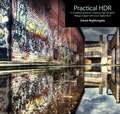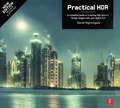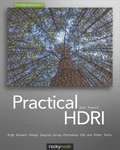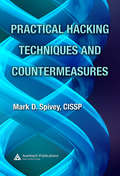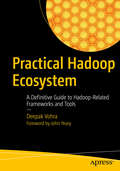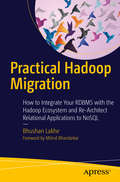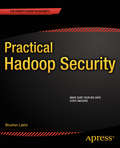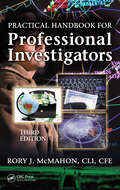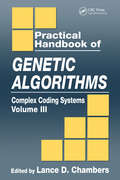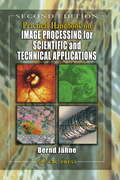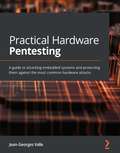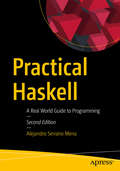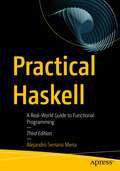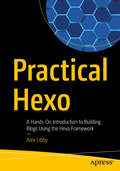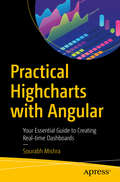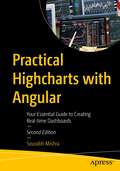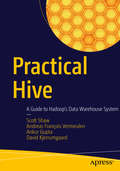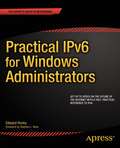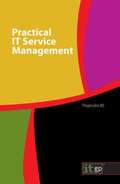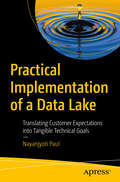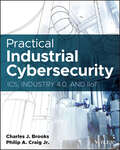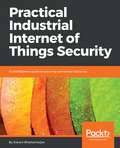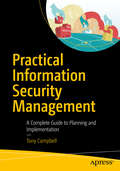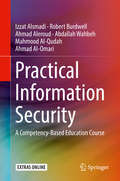- Table View
- List View
Practical Guidelines and Best Practices for Microsoft® Visual Basic® and Visual C#® Developers
by Francesco Balena Giuseppe Dimauro<div xmlns="http://www.w3.org/1999/xhtml"><p>Written by respected developers Francesco Balena and Giuseppe Dimauro, this practical, timesaving reference describes 700+ best programming practices\u2014including when and how to use them\u2014to improve your Microsoft .NET development projects.</p></div>
Practical HDR (2nd Edition): The Complete Guide To Creating High Dynamic Range Images With Your Digital Slr
by David NightingaleThe first edition of David Nightingale's Practical HDR swiftly established itself as the standard work on this cutting-edge processing technique, garnering rave reviews and reprinting several times. Now, technical advances in the field have expanded HDR's possibilities still further, and this second, expanded edition, revised throughout, will cement David's reputation as the most respected writer in the field.Covering new programs, in particular Adobe CS5's HDR capabilities, and with more killer photos from the world's leading lights in HDR processing, Practical HDR will let the reader create jaw-dropping images that demand a second look.
Practical HDR: A complete guide to creating High Dynamic Range images with your Digital SLR
by David NightingaleHDR is both a technical solution to the limitations of digital camera sensors, and a creative tool that can give any image much more impact - but it is not without its pitfalls, and it's essential to understand these if you want to take full advantage of this innovative technique. The second edition of David Nightingale's successful Practical HDR is completely updated with the latest techniques and technologies in HDR. Practical HDR provides you with an abundance of step-by-step examples that will quickly make you an expert on the theory and practice of shooting and processing HDR images, allowing you to get the best possible results every time. As well as practical advice on shooting and processing, the book also contains a global showcase of inspirational HDR images - you will quickly find that HDR offers unparralleled opportunities for indulging your creative instincts, from photo-realistic to hyper-realism.
Practical HDRI
by Jack HowardPractical HDRI, 2nd Edition, by pro photographer Jack Howard, leads you into the the new frontier of High Dynamic Range Imaging, a multi-shot technique to digitally capture, store, and edit the full luminosity range of a scene in ways not possible in a single captured image. Fully updated for 2010, the 2nd Edition covers the HDR process from image capture through post-processing for web and print. Practical HDRI, 2nd Edition is richly illustrated with step-by-step tutorials for creating professional results using the leading HDR software titles, including the latest versions of Adobe Photoshop, Photomatix Pro, FDRTools, Dynamic Photo HDR, and HDR PhotoStudio. Howard instructs from experience as a photographer and a writer, with an emphasis on making the HDR process work for you. Topics include: Step-by-step tutorials Basic and advanced workflows and workarounds Web and print optimization File management, keywording Advice on cameras, gear and software HDR imaging can be challenging and frustrating for the uninitiated, as it involves both field and computer expertise. However, Jack Howard explains this complex subject matter in a practical way that will not intimidate the beginner, nor bore the experienced photographer. The emphasis is on the creative process and how to make it work for you-rather than the science behind it.
Practical Hacking Techniques and Countermeasures
by Mark D. SpiveyPractical Hacking Techniques and Countermeasures examines computer security from the hacker's perspective, demonstrating how a security system can be designed and structured to repel an attack. This book shows how an attack is conceptualized, formulated and performed. With the VMware Workstation software package available on the accompanying CD, it uses virtual computers to illustrate how an attack is executed, including the script, compilation, and results. It offers examples of attacks on Windows and Linux. It also covers such topics as footprinting, scanning, sniffing, passwords, and other attack tools. This text provides valuable information for constructing a system to defend against attacks.
Practical Hadoop Ecosystem
by Deepak VohraLearn how to use the Apache Hadoop projects, including MapReduce, HDFS, Apache Hive, Apache HBase, Apache Kafka, Apache Mahout, and Apache Solr. From setting up the environment to running sample applications each chapter in this book is a practical tutorial on using an Apache Hadoop ecosystem project. While several books on Apache Hadoop are available, most are based on the main projects, MapReduce and HDFS, and none discusses the other Apache Hadoop ecosystem projects and how they all work together as a cohesive big data development platform. What You Will Learn: Set up the environment in Linux for Hadoop projects using Cloudera Hadoop Distribution CDH 5 Run a MapReduce job Store data with Apache Hive, and Apache HBase Index data in HDFS with Apache Solr Develop a Kafka messaging system Develop a Mahout User Recommender System Stream Logs to HDFS with Apache Flume Transfer data from MySQL database to Hive, HDFS, and HBase with Sqoop Create a Hive table over Apache Solr Who This Book Is For: Apache Hadoop developers. Pre-requisite knowledge of Linux and some knowledge of Hadoop is required.
Practical Hadoop Migration
by Bhushan LakhePractical Hadoop Migration shows database developers, database administrators, enterprise architects, and IT leaders how to re-architect relational applications to NoSQL, integrate relational database management systems with the Hadoop ecosystem, and transform and migrate relational data to and from Hadoop components. Winner of IBM's 2012 Gerstner Award for his implementation of big data and data warehouse initiatives and author of Practical Hadoop Security, author Bhushan Lakhe walks you through the entire transition process. First, he lays out the criteria for deciding what blend of re-architecting, migration, and integration between RDBMS and HDFS best meets your transition objectives. Then he demonstrates how to design your transition model. He covers the best-practice design approaches to re-architecting your relational applications and transforming your relational data to optimize concurrency, security, denormalization, and performance in their NoSQL targets. Lakhe proceeds to cover the selection criteria for ETL tools, the implementation steps for migration with SQOOP- and Flume-based data transfers, and transition optimization techniques for tuning partitions, scheduling aggregations, and redesigning ETL. Finally, he assesses the pros and cons of data lakes and Lambda architecture as integrative solutions and illustrates their implementation with real-world case studies. Hadoop/NoSQL solutions do not offer by default cer tain relational technology features such as role-based access control, locking for concurrent updates, and various tools for measuring and enhancing performance. Practical Hadoop Migration shows how to use open-source tools to emulate such relational functionalities in Hadoop ecosystem components.
Practical Hadoop Security
by Bhushan LakhePractical Hadoop Security is an excellent resource for administrators planning a production Hadoopydeployment whoywant to secure their Hadoop clusters. yA detailed guide to theysecurity options and configurationywithin Hadoop itself, author BhushanyLakhe takes you through a comprehensive studyyof how to implement defined security within a Hadoop cluster in a hands-on way. You will start withya detailed overview of all the security options available for Hadoop, includingypopular extensions like Kerberos and OpenSSH, and then delve into a hands-on implementation of user security (with illustrated code samples)ywith both in-the-box features and with security extensions implemented by leading vendors. No security system is complete without a monitoring and tracing facility, so Practical Hadoop Security next steps you throughyaudit logging and monitoring technologies for Hadoop, as well as ready to useyimplementation and configuration examples--again with illustrated code samples. The book concludes with the most important aspect of Hadoop security - encryption. Both types of encryptions, for data in transit and data at rest, are discussed at length with leading open source projects that integrate directly with Hadoop at no licensing cost. y Practical Hadoop Security: Explains importance of security, auditing and encryption within a Hadoop installation Describes how the leading players have incorporated these features within their Hadoop distributions and provided extensions Demonstrates how to set up and use these features to your benefit and make your Hadoop installation secure without impacting performance or ease of use"
Practical Handbook for Professional Investigators
by Rory J. McMahon CLI CFE Randy DicksonThe third edition of this popular volume continues to supply an up-to-date, nuts-and-bolts learning tool for students and an everyday reference for investigative professionals at all levels. More relevant than ever, this edition adds two new chapters on death and terrorism investigations and several new sections, including insurance fraud, fire and arson investigation; indicators of online marital infidelity; obtaining governmental reports; service of subpoenas for witnesses in federal courts; the Rules of Professional Conduct; niche markets in the investigative industry; and managing and marketing an investigative practice.
Practical Handbook of Genetic Algorithms: Complex Coding Systems, Volume III
by Lance D. ChambersPractical Handbook of Genetic Algorithms, Volume 3: Complex Coding Systems contains computer-code examples for the development of genetic algorithm systems - compiling them from an array of practitioners in the field.Each contribution of this singular resource includes:unique code segmentsdocumentationdescripti
Practical Handbook on Image Processing for Scientific and Technical Applications
by Bernd JahneThe second edition of a bestseller, this book is a practical guide to image processing for the natural and technical sciences community. Students, practitioners, and researchers can gain immediate access to a sound basic knowledge of image processing by referencing general principles in the natural sciences. The book describes carefully selected algorithms in detail and demonstrates real-world applications that show the reader how to solve complex image processing problems. Hundreds of photos, figures, diagrams, and tables illustrate the text, and numerous well-organized tips save countless hours in the practical handling of image acquisition and processing.
Practical Hardware Pentesting: A guide to attacking embedded systems and protecting them against the most common hardware attacks
by Jean-Georges ValleExplore embedded systems pentesting by applying the most common attack techniques and patternsKey FeaturesLearn various pentesting tools and techniques to attack and secure your hardware infrastructureFind the glitches in your hardware that can be a possible entry point for attacksDiscover best practices for securely designing productsBook DescriptionHardware pentesting involves leveraging hardware interfaces and communication channels to find vulnerabilities in a device. Practical Hardware Pentesting will help you to plan attacks, hack your embedded devices, and secure the hardware infrastructure. Throughout the book, you will see how a specific device works, explore the functional and security aspects, and learn how a system senses and communicates with the outside world. You will start by setting up your lab from scratch and then gradually work with an advanced hardware lab. The book will help you get to grips with the global architecture of an embedded system and sniff on-board traffic. You will also learn how to identify and formalize threats to the embedded system and understand its relationship with its ecosystem. Later, you will discover how to analyze your hardware and locate its possible system vulnerabilities before going on to explore firmware dumping, analysis, and exploitation. Finally, focusing on the reverse engineering process from an attacker point of view will allow you to understand how devices are attacked, how they are compromised, and how you can harden a device against the most common hardware attack vectors. By the end of this book, you will be well-versed with security best practices and understand how they can be implemented to secure your hardware.What you will learnPerform an embedded system test and identify security critical functionalitiesLocate critical security components and buses and learn how to attack them Discover how to dump and modify stored informationUnderstand and exploit the relationship between the firmware and hardwareIdentify and attack the security functions supported by the functional blocks of the deviceDevelop an attack lab to support advanced device analysis and attacksWho this book is forThis book is for security professionals and researchers who want to get started with hardware security assessment but don't know where to start. Electrical engineers who want to understand how their devices can be attacked and how to protect against these attacks will also find this book useful.
Practical Haskell: A Real World Guide to Programming
by Alejandro Serrano MenaGet a practical, hands-on introduction to the Haskell language, its libraries and environment, and to the functional programming paradigm that is fast growing in importance in the software industry. This book contains excellent coverage of the Haskell ecosystem and supporting tools, include Cabal and Stack for managing projects, HUnit and QuickCheck for software testing, the Spock framework for developing web applications, Persistent and Esqueleto for database access, and parallel and distributed programming libraries.You’ll see how functional programming is gathering momentum, allowing you to express yourself in a more concise way, reducing boilerplate, and increasing the safety of your code. Haskell is an elegant and noise-free pure functional language with a long history, having a huge number of library contributors and an active community. This makes Haskell the best tool for both learning and applying functional programming, and Practical Haskell takes advantage of this to show off the language and what it can do.What You Will LearnGet started programming with HaskellExamine the different parts of the languageGain an overview of the most important libraries and tools in the Haskell ecosystemApply functional patterns in real-world scenariosUnderstand monads and monad transformersProficiently use laziness and resource managementWho This Book Is ForExperienced programmers who may be new to the Haskell programming language. However, some prior exposure to Haskell is recommended.
Practical Haskell: A Real-World Guide to Functional Programming
by Alejandro Serrano MenaGet a practical, hands-on introduction to the Haskell language, its libraries and environment, and to the functional programming paradigm that is fast growing in importance in the software industry. This updated edition includes more modern treatment of Haskell's web framework and APIs.This book contains excellent coverage of the Haskell ecosystem and supporting tools, including Cabal and Stack for managing projects, HUnit and QuickCheck for software testing, WAI and Elm to develop the back end and front end of web applications, Persistent and Esqueleto for database access, and parallel and distributed programming libraries.You’ll see how functional programming is gathering momentum, allowing you to express yourself in a more concise way, reducing boilerplate, and increasing the safety of your code. Haskell is an elegant and noise-free pure functional language with a long history, having a huge number of library contributors and an active community. This makes Haskell the best tool for both learning and applying functional programming, and Practical Haskell, Third Edition takes advantage of this to show off the language and what it can do. Free source code available on the Apress GitHub page for this book.What You Will LearnGet started programming with HaskellExamine the different parts of the languageGain an overview of the most important libraries and tools in the Haskell ecosystemApply functional patterns in real-world scenariosUnderstand monads and monad transformersProficiently use laziness and resource managementWho This Book Is ForExperienced programmers who may be new to the Haskell programming language. However, some prior exposure to Haskell is recommended.
Practical Hexo: A Hands-On Introduction to Building Blogs Using the Hexo Framework
by Alex LibbyLeverage the power of Hexo to quickly produce static blog sites that are efficient and fast. This project-oriented book simplifies the process of setting up Hexo and manipulating content, using little more than a text editor and free software. It will equip you with a starting toolset that you can use to develop future projects, incorporate into your existing workflow and allow you to take your websites to the next level. Hexo is based on JavaScript and Node.js, two of the biggest tools available for developers: you can enhance, extend, and configure Hexo as requirements dictate. With Hexo the art of possible is only limited by the extent of your imagination and the power of JavaScript and Node.js.Practical Hexo gets you quickly acquainted with creating and manipulating blogs using a static site generator approach. You will understand how to use the Hexo framework to rapidly create and deploy blogs that are performant, with the minimum of fuss, then extend and customize your content using plugins and themes. You will work through some practical projects to help solidify your skills, and put them into practice. What You'll LearnImplement the Hexo framework in a projectCustomize and extend contentConsider maintenance requirements and how they compare to other blog systemsApply skills to practical, real-world projectsCreate themes and build pluginsMake changes using other tools and libraries. Who This Book Is For Website developers who are already familiar with JavaScript and keen to learn how to leverage the Hexo framework. Agile development team members, where time is of the essence to deliver results quickly. Developers who want to focus on simplicity, to produce efficient and properly optimized content in modern browsers using tools already in their possession.
Practical Highcharts with Angular: Your Essential Guide to Creating Real-time Dashboards
by Sourabh MishraHighcharts is a popular charting product that provides stunning animated and interactive charts. This concise book examines data analysis and construct the right graph. Nowadays, charting is used by the finance, education, entertainment, sports and real estate sectors to analyse their data. Built on top of of modern Javascript frameworks like jQuery and Angular, Highcharts enables developers to easily construct charts that will work in all modern browsers with pure knowledge of HTML, CSS, and JavaScript. You'll see how to use Highcharts, call backend services for data, and easily construct real-time data dashboards. You'll also learn how you can club your code with jQuery and Angular. This book provides the best solutions for real-time challenges and covers a wide range of charts including line, area, maps, plot, different types of pie chart, Gauge, heat map, Histogram chart, stacked bar, scatter plot and 3D Charts. After reading this book, you'll be able to export your charts in different formats for project-based learning. What You'll Learn Basics of Angular, consuming service through angular and implement highcharts using Angular. Use and export different chart types Work on a real-time data project calling Web API and Ajax calls through the various data sources using Angular.Create interactive styling themes and colors for a dashboard Who This Book Is For Developers, tech leads, architects or students with basic knowledge of HTML, CSS, and JavaScript who want to develop high performing, stunning, smooth, and interactive animated charts for your web products.
Practical Highcharts with Angular: Your Essential Guide to Creating Real-time Dashboards
by Sourabh MishraLearn to create stunning animated and interactive charts using Highcharts and Angular. This updated edition will build on your existing knowledge of HTML, CSS, and JavaScript to develop impressive dashboards that will work in all modern browsers.You will learn how to use Highcharts, call backend services for data, and easily construct real-time data dashboards so you can club your code with jQuery and Angular. This book provides the best solutions for real-time challenges and covers a wide range of charts including line, area, maps, plot, and much more. You will also learn about arc diagrams, bubble series, dependency wheels, and error bar series. After reading this book, you'll be able to export your charts in different formats for project-based learning. Highcharts is one the most useful products worldwide for developing charting on the web, and Angular is well known for speed. Using Highcharts with Angular developers can build fast, interactive dashboards. Get up to speed using this book today. What You’ll LearnCreate interactive animated styling themes and colors for a dashboardWork on a real-time data project using Web API and Ajax calls through different data sourcesExport charts in various formats Who This Book Is For Developers, dev leads, software architects, students or enthusiasts who are already familiar with HTML, CSS, and JavaScript.
Practical Hive
by Scott Shaw Ankur Gupta Andreas François Vermeulen David KjerrumgaardDive into the world of SQL on Hadoop and get the most out of your Hive data warehouses. This book is your go-to resource for using Hive: authors Scott Shaw, Ankur Gupta, David Kjerrumgaard, and Andreas Francois Vermeulen take you through learning HiveQL, the SQL-like language specific to Hive, to analyze, export, and massage the data stored across your Hadoop environment. From deploying Hive on your hardware or virtual machine and setting up its initial configuration to learning how Hive interacts with Hadoop, MapReduce, Tez and other big data technologies, Practical Hive gives you a detailed treatment of the software. In addition, this book discusses the value of open source software, Hive performance tuning, and how to leverage semi-structured and unstructured data. What You Will Learn Install and configure Hive for new and existing datasets Perform DDL operations Execute efficient DML operations Use tables, partitions, buckets, and user-defined functions Discover performance tuning tips and Hive best practices Who This Book Is For Developers, companies, and professionals who deal with large amounts of data and could use software that can efficiently manage large volumes of input. It is assumed that readers have the ability to work with SQL.
Practical IPv6 for Windows Administrators
by Edward HorleyPractical IPv6 for Windows Administrators is a handy guide to implementing IPv6 in a Microsoft Windows environment. This is the book you need if you are a Microsoft Windows Administrator confronted with IPv6 and in need of a quick resource to get up and going. The book covers the current state of IPv6 and its support in Microsoft Windows. It provides best-practices and other guidance toward successful implementation. This book is especially written with the goal of translating your current expertise in IPv4 into the new realm of IPv6. Special attention is given to dual-stack configurations, helping you to run IPv4 and IPv6 side-by-side and support both protocol versions during a transition period. Practical IPv6 for Windows Administrators is also a fast reference you can look at to get something done quickly. It covers IPv6 addressing, management of IPv6 from Powershell, Advanced Firewall configuration, and use of IPv6 in Hyper-V and virtual networking environments. You'll find practical examples showing how IPv6 integrates with all the standard tools you use for IPv4 today, tools like DNS and DHCP. You'll also find insider knowledge on IPv6 that can help avert stumbling points on the road to deployment. Provides a quick path from IPv4 expertise to IPv6 implementation Gives best-practices specific to Windows on IPv6 and dual stack networks Is chock full of practical examples showing how to manage IPv6 on Windows What you'll learn Understand IPv6 addressing and how it works in Windows Implement best practices involving IPv6 for Exchange, IIS, and SharePoint Manage IPv6 from PowerShell and the Windows Advanced Firewall Deploy IPv6 from virtual networking environments such as in Hyper-V Integrate IPv6 into Windows Server functions such as DNS, DHC, and Active Directory Take advantage of IPv6 transition technologies that are supported in Windows Who this book is for Practical IPv6 for Windows Administrators is ideal for those working with Microsoft Windows operating systems who need to implement IPv6. The book is is designed for Microsoft Windows Administrators, but is also useful for developers, network engineers, and storage administrators who are involved in the architecture of Windows solutions. Table of Contents IPv6: The Big Picture IPv6 Support in Windows IPv6 Addressing IPv6 Best Practices in Windows IPv6 and PowerShell IPv6 and Advanced Firewall IPv6 in Hyper-V and Virtual Networking IPv6 and DNS IPv6 and DHCP Miscellaneous IPv6 Items
Practical IT Service Management
by Thejendra BSThis book shows you how to set up a technical service management structure, using the best practice framework established by the IT Infrastructure Library. The ITIL system is the most widely accepted approach to technical IT service management worldwide. It teaches technical support staff how to provide the efficient IT services that are vital to your company's success.
Practical Implementation of a Data Lake: Translating Customer Expectations into Tangible Technical Goals
by Nayanjyoti PaulThis book explains how to implement a data lake strategy, covering the technical and business challenges architects commonly face. It also illustrates how and why client requirements should drive architectural decisions. Drawing upon a specific case from his own experience, author Nayanjyoti Paul begins with the consideration from which all subsequent decisions should flow: what does your customer need? He also describes the importance of identifying key stakeholders and the key points to focus on when starting a new project. Next, he takes you through the business and technical requirement-gathering process, and how to translate customer expectations into tangible technical goals. From there, you’ll gain insight into the security model that will allow you to establish security and legal guardrails, as well as different aspects of security from the end user’s perspective. You’ll learn which organizational roles need to be onboarded into the data lake, their responsibilities, the services they need access to, and how the hierarchy of escalations should work. Subsequent chapters explore how to divide your data lakes into zones, organize data for security and access, manage data sensitivity, and techniques used for data obfuscation. Audit and logging capabilities in the data lake are also covered before a deep dive into designing data lakes to handle multiple kinds and file formats and access patterns. The book concludes by focusing on production operationalization and solutions to implement a production setup. After completing this book, you will understand how to implement a data lake, the best practices to employ while doing so, and will be armed with practical tips to solve business problems. What You Will Learn Understand the challenges associated with implementing a data lakeExplore the architectural patterns and processes used to design a new data lakeDesign and implement data lake capabilitiesAssociate business requirements with technical deliverables to drive success Who This Book Is For Data Scientists and Architects, Machine Learning Engineers, and Software Engineers.
Practical Industrial Cybersecurity: ICS, Industry 4.0, and IIoT
by Charles J. Brooks Philip A. Craig Jr.A practical roadmap to protecting against cyberattacks in industrial environments In Practical Industrial Cybersecurity: ICS, Industry 4.0, and IIoT, veteran electronics and computer security author Charles J. Brooks and electrical grid cybersecurity expert Philip Craig deliver an authoritative and robust discussion of how to meet modern industrial cybersecurity challenges. The book outlines the tools and techniques used by practitioners in the industry today, as well as the foundations of the professional cybersecurity skillset required to succeed on the SANS Global Industrial Cyber Security Professional (GICSP) exam. Full of hands-on explanations and practical guidance, this book also includes: Comprehensive coverage consistent with the National Institute of Standards and Technology guidelines for establishing secure industrial control systems (ICS) Rigorous explorations of ICS architecture, module and element hardening, security assessment, security governance, risk management, and morePractical Industrial Cybersecurity is an indispensable read for anyone preparing for the Global Industrial Cyber Security Professional (GICSP) exam offered by the Global Information Assurance Certification (GIAC). It also belongs on the bookshelves of cybersecurity personnel at industrial process control and utility companies. Practical Industrial Cybersecurity provides key insights to the Purdue ANSI/ISA 95 Industrial Network Security reference model and how it is implemented from the production floor level to the Internet connection of the corporate network. It is a valuable tool for professionals already working in the ICS/Utility network environment, IT cybersecurity personnel transitioning to the OT network environment, and those looking for a rewarding entry point into the cybersecurity field.
Practical Industrial Internet of Things Security: A practitioner's guide to securing connected industries
by Sravani BhattacharjeeSkillfully navigate through the complex realm of implementing scalable, trustworthy industrial systems and architectures in a hyper-connected business world.Key FeaturesGain practical insight into security concepts in the Industrial Internet of Things (IIoT) architectureDemystify complex topics such as cryptography and blockchainComprehensive references to industry standards and security frameworks when developing IIoT blueprintsBook DescriptionSecuring connected industries and autonomous systems is a top concern for the Industrial Internet of Things (IIoT) community. Unlike cybersecurity, cyber-physical security is an intricate discipline that directly ties to system reliability as well as human and environmental safety. Practical Industrial Internet of Things Security enables you to develop a comprehensive understanding of the entire spectrum of securing connected industries, from the edge to the cloud.This book establishes the foundational concepts and tenets of IIoT security by presenting real-world case studies, threat models, and reference architectures. You’ll work with practical tools to design risk-based security controls for industrial use cases and gain practical know-how on the multi-layered defense techniques including Identity and Access Management (IAM), endpoint security, and communication infrastructure. Stakeholders, including developers, architects, and business leaders, can gain practical insights in securing IIoT lifecycle processes, standardization, governance and assess the applicability of emerging technologies, such as blockchain, Artificial Intelligence, and Machine Learning, to design and implement resilient connected systems and harness significant industrial opportunities.What you will learnUnderstand the crucial concepts of a multi-layered IIoT security frameworkGain insight on securing identity, access, and configuration management for large-scale IIoT deploymentsSecure your machine-to-machine (M2M) and machine-to-cloud (M2C) connectivityBuild a concrete security program for your IIoT deploymentExplore techniques from case studies on industrial IoT threat modeling and mitigation approachesLearn risk management and mitigation planningWho this book is forPractical Industrial Internet of Things Security is for the IIoT community, which includes IIoT researchers, security professionals, architects, developers, and business stakeholders. Anyone who needs to have a comprehensive understanding of the unique safety and security challenges of connected industries and practical methodologies to secure industrial assets will find this book immensely helpful. This book is uniquely designed to benefit professionals from both IT and industrial operations backgrounds.
Practical Information Security Management
by Tony CampbellCreate appropriate, security-focused business propositions that consider the balance between cost, risk, and usability, while starting your journey to become an information security manager. Covering a wealth of information that explains exactly how the industry works today, this book focuses on how you can set up an effective information security practice, hire the right people, and strike the best balance between security controls, costs, and risks. Practical Information Security Management provides a wealth of practical advice for anyone responsible for information security management in the workplace, focusing on the 'how' rather than the 'what'. Together we'll cut through the policies, regulations, and standards to expose the real inner workings of what makes a security management program effective, covering the full gamut of subject matter pertaining to security management: organizational structures, security architectures, technical controls, governance frameworks, and operational security. This book was not written to help you pass your CISSP, CISM, or CISMP or become a PCI-DSS auditor. It won't help you build an ISO 27001 or COBIT-compliant security management system, and it won't help you become an ethical hacker or digital forensics investigator - there are many excellent books on the market that cover these subjects in detail. Instead, this is a practical book that offers years of real-world experience in helping you focus on the getting the job done. What You Will Learn Learn the practical aspects of being an effective information security manager Strike the right balance between cost and risk Take security policies and standards and make them work in reality Leverage complex security functions, such as Digital Forensics, Incident Response and Security Architecture Who This Book Is For Anyone who wants to make a difference in offering effective security management for their business. You might already be a security manager seeking insight into areas of the job that you've not looked at before, or you might be a techie or risk guy wanting to switch into this challenging new career. Whatever your career goals are, Practical Security Management has something to offer you.
Practical Information Security: A Competency-based Education Course
by Ahmed Aleroud Izzat Alsmadi Robert Burdwell Abdallah Wahbeh Mahmoud Ali Al-Qudah Ahmad Al-OmariThis textbook presents a practical introduction to information security using the Competency Based Education (CBE) method of teaching. The content and ancillary assessment methods explicitly measure student progress in the three core categories: Knowledge, Skills, and Experience, giving students a balance between background knowledge, context, and skills they can put to work. Students will learn both the foundations and applications of information systems security; safeguarding from malicious attacks, threats, and vulnerabilities; auditing, testing, and monitoring; risk, response, and recovery; networks and telecommunications security; source code security; information security standards; and compliance laws. The book can be used in introductory courses in security (information, cyber, network or computer security), including classes that don't specifically use the CBE method, as instructors can adjust methods and ancillaries based on their own preferences. The book content is also aligned with the Cybersecurity Competency Model, proposed by department of homeland security. The author is an active member of The National Initiative for Cybersecurity Education (NICE), which is led by the National Institute of Standards and Technology (NIST). NICE is a partnership between government, academia, and the private sector focused on cybersecurity education, training, and workforce development.

